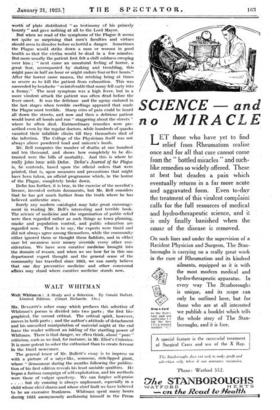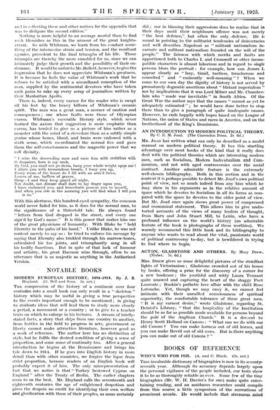-WALT WHITMAN
Walt Whitman : A‘Study and a Selection. By Gerald Bullet-t. Limited Edition. (Grant Richards. 15s.) MR. Bummrr's sober essay which prefaces this selection of Whitman's poems is divided into two parts ; the first bio- graphical, the second critical. The critical spirit, however, Moves in both parts ; and the author's attitude of detachment and his unexcited manipulation of material might at the end leave the reader without an inkling of the startling power of Whitman. There is that danger, we often think, about "pure" criticism, such as we find, for instance, in Mr. EliOt's'Criterion.• It is more potent to sober the enthusiast than to create fervour in the timid newcomer.
The general tenor of Mr. Bullett's essay is to impress us with a picture of a satyr-like, sensuous, rich-lipped giant, whose demeanour during the months following the publice, tion of his first edition reveals his least amiable qualities. He began a furious campaign of self-exploitation, and his methods were thoSe of vulgar quackery. We can forgive self-praise . . but sly cunning is always unpleasant, especially in a child whcise chief charm and whose chief fault we have believed to be an excessive frankness. Whitman spent many hours durhig 1855 anonymously acclaiming himself in the Press, an 1 in collecting these and other notices for the appendix that was to disfigure the second edition."
Nothing is more helpful to an average mortal than to find such blemishes its this in the armour of the great knights- errant. So with Whitman, we learn from his conduct- some- thing of the internecine strain and tension, and the resultant agonies, precedent to the final triumphs of his life. Those triumphs are thereby the more ennobled for us, since we can intimately judge their growth and the possibility of their en- durance. It would be unfair to Mr. Bullett, however, to give the impression that he does not appreciate Whitman's greatneSs. It is because he feels the value of Whitman's work that he refuses to be satisfied with a secondhand conception of the man, supplied by the sentimental' devotees who have taken such pains to rake up every scrap of journalism written by their Manhattan Apollo.
There is, indeed, every excuse for the reader who is swept off his feet by the heavy billows of Whitman's oceanic spirit. The man was a great man, a scorner of caution and consequences ; one whose faults were those of Olympian excess. Whitman's execrable literary style, which never learned the axiom that suggestion is more emphatic than excess, has tended to give us a picture of him rather as a monster with the mind of a stevedore than as a subtly simple genius whose bones, blood, and brain were endowed with a sixth sense, which co-ordinated the normal five and gave them the self-consciousness and the magnetic poWer that we call divinity.
" I seize the descending man and raise him with resistless will, O despairer, here is my neck,
By God, you stiall.not go down, hang your whole weight upon me ! I dilate you with tremendous breath, I buoy you up, t Every room of the house do I fill with an arm'd farce, Lovers of me, bafflers of graves. Sleep—I and they keep guard all night, Not doubt, not disease shall dare to lay finger upon you,
I have einbraced you, and henceforth possess you to myself, And when you rime in the morning you will find-what I tell you
is so."
With this alertness, this hundred-eyed. sympathy, the common world never faded for him, as it- does for the- normal man, to the significance of a thricetold tale. He always found " letters from God dropped in the street, and every one sign'd by God's name." It is this power that makes him one of the great physicians of humanity. With Blake he " held Eternity in the palm:of his hand." Unlike Blake, he Was not content merely to say so : he tried to enforce his message by saying- that Eternity also, rickled through his marrow-bones, articulated his toe joints, and triumphantly sang in all
his bodily functions. But in spite of that lack of humour and artistry, his great Daemon wins through, often to an utterance that is as majestic as anything in the Authorized Version.















































 Previous page
Previous page